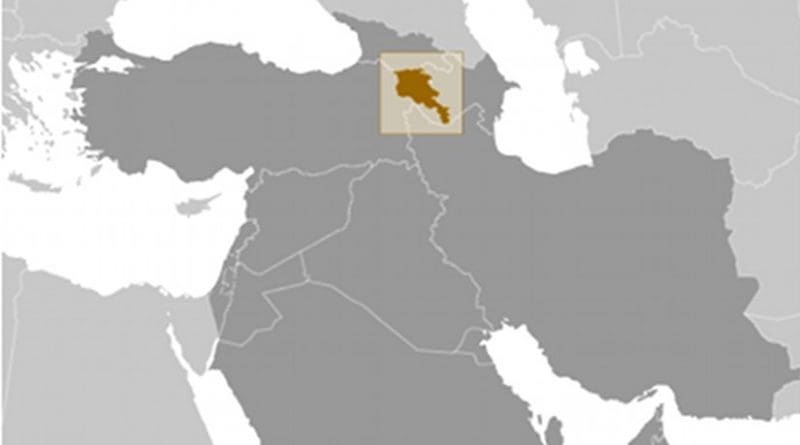Post-Sanctions Iran And Armenia: What To Expect? – OpEd
Armenia, a northern neighbor of the Islamic Republic of Iran, is delighted with the recent lifting of the international sanctions on Iran. The Armenian government is looking forward to further strengthening its cooperation with Iran and expectations are particularly high in the energy and transportation fields. This cooperation would certainly ease the economic and political blockade imposed on Armenia by Turkey and Azerbaijan. However, Armenia’s membership in the Eurasian Economic Union (EEU), a Russian-led economic bloc, may create a number of unique obstacles that might impede the rekindling of a prosperous bilateral relationship between the two countries.
Armenia has always viewed Iran as a crucial ally in its combat against the aforementioned economic and political isolation as well as against its geographical dependence on Georgian transit routes. On the other hand, Iran is also keen on further developing its relations with Armenia for various political and economic reasons, with a major one being the possibility of gaining access to EEU markets.
Armenia and Iran, despite distinct religious differences, share a number of historic events and cultural values. The two countries also have common problems associated with isolation from regional projects. For instance, neither country was included in the Baku-Tbilisi-Ceyhan oil pipeline project. Instead, they have initiated their own gas pipeline, which was initially aimed at making Armenia a transit state through which Iranian gas could be exported to and sold in Europe.
Moreover, the construction of this $220 million gas pipeline would allow Armenia to find an alternative gas supplier and thus become less dependent on Russia’s energy sources. However, due to Russia’s predictable intervention, the pipeline’s diameter was reduced from 1,420 to 700 millimeters, thus making the export of Iranian gas to Europe via Armenia unfeasible.
Almost as soon as the nuclear deal was signed between Iran and the P5+1 powers, Armenia decided not to miss the strategic opportunity resulting from the gradual lifting of sanctions from its southern neighbor. Already in August, 2015 Iran and Armenia signed an agreement regarding the construction of the third electricity transmission line between the two states. This project, which is worth around $120 million, would increase the electricity transmission capacity between Iran and Armenia, and would enable Armenia to export 6 billion kWh annually instead of the current 1.3 billion kWh of energy. This information was provided by the Deputy Minister of Energy and Natural Resources of Armenia, Areg Galstyan, during a recent seminar titled “The changes of energy security of the Republic of Armenia”.
Another important development in the Iranian-Armenian relations occurred on October 14, 2015, when Iran’s first vice-president, Eshaq Jahangiri, arrived in Yerevan, which also made him the highest-ranking Iranian official to travel to Armenia since 2011. According to the Iranian media, the major goal of this visit was to revive certain Armenian-Iranian economic projects, which were postponed because of the sanctions. For now, the two parties are also trying to consolidate their relations in the transportation sector. For that purpose, the two states restarted discussions over the construction of the Iranian-Armenian railway, the preliminary proposal for which dates back to 2009. The railway construction, which would cost roughly $3 billion, has also obtained an interest from China, which via this railway may alter the path of exporting its goods to Europe. Therefore, on September 21, 2015, being aware of the possible potentnial for Chinese involvement in the project, an Armenian delegation, headed by prime minister Hovik Abrahamyan, paid a visit to China to discuss the perspectives of getting sufficient funds for the construction of the costly Armenian part of the railway.
Meanwhile, by putting an emphasis on its geographical stance, Armenia also seeks to become a so-called “bridge” for re-engaging Iran into the international arena. Iran and Armenia have been discussing the possibility of making trading tariffs lower for a long time. However, since Armenia’s accession to the EEU in January, 2015, the country is not allowed to sign bilateral free-trade agreements with other states. For that purpose, according to the announcement of Armenia’s Deputy Foreign Minister Shavarsh Kocharian in September, 2015, Armenia has launched talks in the EEU for signing free-trade agreement with Iran. During his visit to Armenia, the Iranian vice-president has also stressed the importance of developing trade relations with Armenia by emphasizing Armenia’s role as a transit zone for exporting Iranian goods to EEU.
Yerevan would certainly wish to expand and intensify the opportunities for cooperation with Tehran on a sector-by-sector ground; such sectors may be air travel and tourism. And although Iran is currently the number four largest trading partner of Armenia, after the European Union, Russia and China, respectively, the potential of enhancing the scopes of trade cooperation has dramatically increased of late.
Nevertheless, it seems that Armenia’s geographical advantage may be threatened by the geopolitical environment. Russia would not easily accept the diminished Armenian dependence on its trade and energy resources. And due to the Vienna deal, Iran’s further actions in the South Caucasus may bring back the historic competition with Russia for the influence in the region. Thus, the situation may change once Iran decides to exploit its current status and resources and get re-engaged in the South Caucasus to strengthen its stance in this region.
Conversely, today Iran is a very important ally for Russia, and partnership with Armenia would hardly be able to deteriorate this strategic relationship. Furthermore, the two countries have similar stands on the Syrian problem. Besides, by intensifying cooperation with Iran, Russia also wants to exclude the chances of Iran’s possible rapprochement with the West and the United States. Therefore, it seems that if the Armenian government manages to carefully maneuver in this situation, it may bolster its ties with Iran, without spoiling its relations with Russia.


Very well-written, interesting and informative article with a unique take on the topic.